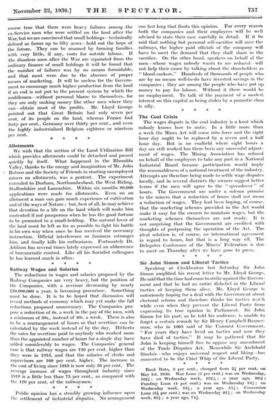Railway Wages and Salaries
The reductions in wages and salaries proposed by the Railway Companies arc very heavy, but the position of the Companies, with a revenue decreasing by nearly £10,000,000 a year, is. becoming precarious. Something must be done. It is to be hoped that discussion will reveal methods of economy which inay yet make the full reductions 'proposed unnecessary. The Companies pro- pose a reduction of Gs. a week in the pay of the men, with a minimum of Ns.; instead of 40s. a week. There is also to be a rearrangement of hours so that overtime can be calculated by the week instead of by. the day. Hitherto the rates for overtime paid to anybody who worked more than the appointed number of hours for a single day have added considerably to wages. The Companies' general case is that railway wages are 120 per cent. higher than they were in 1913, and that the salaries of clerks and supervisors are 100 per cent. higher. The increase in the cost of-living since 1918 is now only 56 per cent: The average increase of wages - throughout industry since 1913 is a little leas*than 75: percent., as compared with the 120 per cent.- of-the railwaymen.-


















































































 Previous page
Previous page